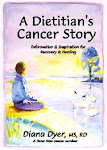An article published this week in the Feb 23, 2009 issue of The Archives of Internal Medicine showed decreased risk of digestive cancers in both men and women with increased intake of calcium from food and supplements (along with an overall decreased risk of cancer in women but not men). Although thoughtful comments about the observational study acknowledged that it is impossible to tease out whether the benefits came from calcium intake or vitamin D intake, what I would like to highlight is that almost all of the articles in the popular press about this new research pointed to dairy foods as the source of calcium in our diets.
Dairy foods may be the most widely known source of calcium, and they are certainly the most widely advertised source. However, many other foods are a source of natural and supplemental calcium and with a little planning can contribute significantly to an optimal calcium intake. The US Dietary Guidelines recommend consuming 3 servings of dairy foods/day (with a typical 1 cup serving of milk containing 300 mg calcium) to achieve an intake of 1000 mg calcium/day for ages 19-50 and 1200 mg calcium/day for those over age 50.
Here are other widely available food sources to achieve those goals:
300 mg of calcium
Fortified orange juice or V-8, 8 ounces
Fortified soymilk, 8 ounces
Fortified rice milk, 8 ounces
Luna Bar
200 mg of calcium
Apple juice, 8 ounces, calcium-fortified
Blackstrap molasses, 1 tablespoon
Collard greens, 1/2 cup, cooked
Tofu, calcium-set, 1/2 cup
Calcium-fortified breakfast cereal, 1 ounce
100 mg of calcium
Turnip greens, kale or broccoli, 1/2 cup, cooked
Soybeans, 1/2 cup, cooked
Soynuts, 1/2 cup
Instant oatmeal, 1 package
Dried figs, 5
75 mg of calcium
Almond butter or tahini, 2 tablespoons
Textured vegetable protein, 1/2 cup, prepared
Bok choy or mustard greens, 1/2 cup, cooked
Tempeh, 1/2 cup
50 mg of calcium
Navy beans, Great Northern beans or Black beans, 1/2 cup, cooked
Vegetarian baked beans, 1/2 cup
Orange, 1
Almonds, 2 tablespoons
Instant Cream of Wheat, 1 package
Source: RD Resources for Consumers: Meeting Calcium Recommendations on a Vegan Diet by the Vegetarian Nutrition Dietetic Practice Group of the American Dietetic Association
See USDA's Nutrient Data Base for Standard Reference for more information on the calcium content of foods.
One article in the press I saw did mention that dairy foods do contain other potential cancer-preventing nutrients like vitamin D and a molecule called conjugated linoleic acid (CLA). However, it should also have been pointed out that not all dairy foods contain vitamin D (check the labels on ice cream, yogurt, and cheese - most are not made from milk that has been fortified with vitamin D) and milk contains significant amounts of CLA only if the cows have eaten grass, not corn, soybeans, or other grains. In addition, the amounts of vitamin D and CLA in dairy foods, while better than nothing, may not be enough by itself to really have significant cancer-prevention properties.
Please do not interpret this post as "anti-dairy". I do consume one serving/day of organic dairy foods as one source of my dietary calcium, vitamin D, and CLA (as my milk comes from grass-fed cows), and health-promoting probiotics (most of the dairy I consume is yogurt or kefir). However, I believe that people benefit from more complete information about how to better plan their food and meals around nutrient needs and thus optimize their health rather than only rely on the information provided by the singularly-focused "3-A-Day" promotion for dairy foods.
How about an additional marketing campaign for strong bone plus cancer prevention called "Got Kale (and other greens)?" I like the sound and taste of that!
Diana Dyer, MS, RD
Subscribe to:
Post Comments (Atom)



No comments:
Post a Comment